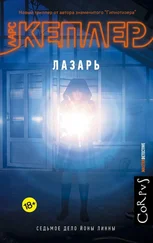‘In the USA?’
‘We were visiting a church in Troy. We were there two months, I got home the day before yesterday... there was a revivalist meeting on a wooden bridge with a roof,’ Pasi smiles. ‘Like the barrel of a cannon filled with prayer and song, that in itself made the whole trip worthwhile.’
Margot and Adam keep hold of Pasi while they confirm what he says with the passport authority. It all checks out, and they apologise for troubling him, get back in the car and drive off through the dark forest.
‘So, did you see the light?’ Adam says after a while.
‘Almost.’
‘I need to go home.’
‘OK,’ she says. ‘I can talk to Thomas Apel on my own.’
‘No,’ Adam says.
‘We know he isn’t violent.’
Thomas Apel is the stake president of the Church of Jesus Christ of Latter-day Saints, out in Jakobsberg. Of the five hundred names on their list, he’s the only one who has suffered from a borderline psychotic personality disorder.
‘Let’s do that tomorrow,’ Adam pleads.
‘OK,’ she lies.
He glances sideways at her.
‘It’s just that Katryna doesn’t like being at home on her own,’ he confesses.
‘Yes, you’ve been away a lot recently.’
‘It’s not that...’
She drives slowly along the winding forest track. The baby in her stomach moves and stretches out.
‘I could have a word with Jenny,’ Margot says. ‘I’m sure she could go and be with Katryna.’
‘I don’t think so,’ he says with a smile.
‘What?’ she laughs.
‘No, stop it...’
‘Are you worried Katryna might lose her virginity?’
‘Stop it,’ Adam says, squirming in his seat.
Margot picks up a biscuit and waits for him to say whatever he’s trying to say.
‘I know Katta, and she wouldn’t want me to arrange for someone to keep her company. She just wants me to prove that I care about our relationship... I’ll go home as soon as we’ve spoken to Thomas Apel.’
‘OK,’ Margot says, and can’t help feeling relieved that Jenny isn’t going to have to spend the night with Katryna.
The private limited company, Sofa Zone, turns out to be based on Kvicksundsvägen in Högdalen industrial estate, close to the railway depot.
Erik and Joona are driving along next to a barbed-wire fence, towards thirty or so parked dustbin lorries. Grey drizzle is falling, sparkling like sand.
The little monkey girl is swinging beneath the ignition key.
In the distance white smoke is billowing from a chimney on the far side of some tall electricity wires.
They pass wide, empty roads between low industrial buildings bearing corporate flags and signs about private security companies, alarms and camera surveillance.
Barbed-wire fences glint in front of car parks full of articulated lorries, vans and containers.
The windscreen wipers sweep the rain aside mechanically, leaving a dirty triangle beyond the reach of the blades.
‘Pull over,’ Joona says.
Erik drives round an old tyre by the side of the road, slows down and stops the car.
On the other side of the road weeds and dandelions are growing in front of a tall fence crowned with four rows of barbed wire.
They stare at the big, corrugated-metal building. Rust has trickled down from the screws holding up the large sign bearing the name: Sofa Zone .
‘This is the Zone, isn’t it?’ Erik says seriously.
‘Yes,’ Joona says, and drifts off in thought.
Rain covers the windscreen as soon as the wipers stop. The tiny drops quickly form little streams.
The Zone’s only window is in the office at the front; it’s grimy and covered with bars. In the parking spaces next to the fence stand nine private cars and two motorbikes.
‘What are we going to do?’ Erik says after a while.
‘If Rocky is here, we try to get him out,’ Joona says. ‘And if he doesn’t agree to that, you’ll have to question him here, but... it’s not enough for him to say that the preacher takes drugs, wears make-up and—’
‘I know, I know.’
‘We need an address, a name,’ he concludes.
‘So how do we get inside?’
Joona opens the door and cool air brings a smell of wet grass into the car. The noise of the huge railway yard can be heard over the sound of the worsening rain.
They leave the car and cross the road. The rain is cooling the ground and mist is rising from the tarmac.
‘How does your hip feel?’ Erik asks.
‘Fine.’
They go through the gates into the industrial estate. There’s wet cardboard on the ground, with disintegrating labels for three-seat sofas and double divans. Through the filthy window they can see that the office is dark.
A car stops in the car park and a man in a dark-grey suit gets out and walks round the far end of the building.
They wait a few moments, then follow him along the windowless façade. Joona takes out his phone and films the car’s registration number as he passes.
On the end of the warehouse is a concrete loading bay with metal steps. Beside the large, rolling door for goods is a smaller, buckled steel door.
They carry on to the end of the building, crossing the shimmering black tarmac, past a stack of wooden pallets.
The man has disappeared.
Erik and Joona exchange a glance, then continue round the corner.
Pieces of polystyrene packaging swirl across the wet ground.
At the back of the warehouse is a skip surrounded by bindweed and thistles. All the way to the fence are mounds of sand.
Their feet leave prints in the wet sand. The man they were following evidently didn’t come this way.
The steel door by the loading bay must be the entrance to the building.
They carry on along the rear of the building, across the sand, feeling the rain drip down their necks. Close to the far corner is another metal door at the bottom of a flight of steps, with metal rails to help move wheelie-bins up and down.
‘Give me the car keys.’
Erik hands them to him and he removes the metal ring, hands back the little monkey and key, straightens out the metal and makes a hook at the end, pulls a ballpoint pen from his pocket, snaps off the clip and sticks it into the lock, then inserts the straightened keyring, pushes the clip upwards and turns the lock.
The bulb hanging from the ceiling of the waste-storage room is broken. The floor is stained from leaking rubbish, and four bins reek of rancid food. The tattered remnants of a list of rules and regulations hangs off the wall. In the weak light from outside, Joona can see another door at the far end of the room.
‘Come on,’ he says to Erik.
He cautiously opens the door and peers into a small kitchen with a buckled draining board. Rhythmic thuds echo through the walls. The ceiling lamp is on but there’s no one about. On a table there’s a chopping board with a grease-stained paper bag, surrounded by crumbs and sugar crystals.
There are two closed wooden doors in the far wall. The first is locked, but the second one has no lock.
Joona tries the handle, and they walk slowly into an empty changing room. They can hear music through the walls.
The door to the bathroom is closed.
They walk cautiously across the concrete floor, past three shower cubicles, a mirrored make-up table, and a row of clothes lockers.
Someone flushes the toilet, and they hurry through the room and find themselves in a narrow corridor lined with ten doors. The small rooms off the corridor have no windows, and are furnished with thin beds with shiny plastic mattresses.
Behind a closed door someone is moaning mechanically.
The only light comes from strings of fairy lights draped across the ceiling. Little hearts and flowers illuminate the bare walls in weak, flickering colours.
Читать дальше
Конец ознакомительного отрывка
Купить книгу
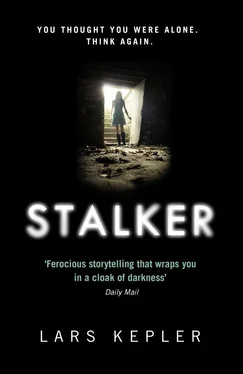
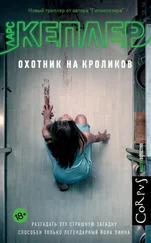
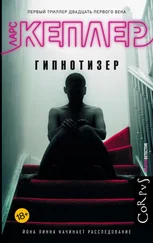
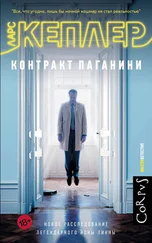
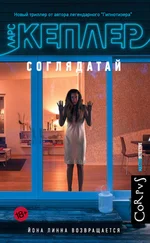
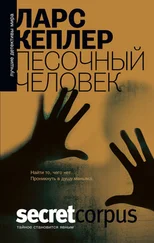
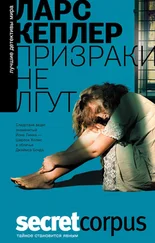

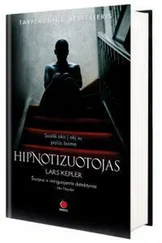
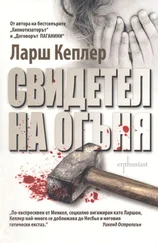
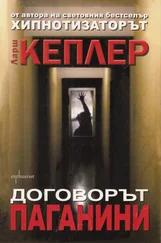
![Ларс Кеплер - Гипнотизер [litres]](/books/402890/lars-kepler-gipnotizer-litres-thumb.webp)
